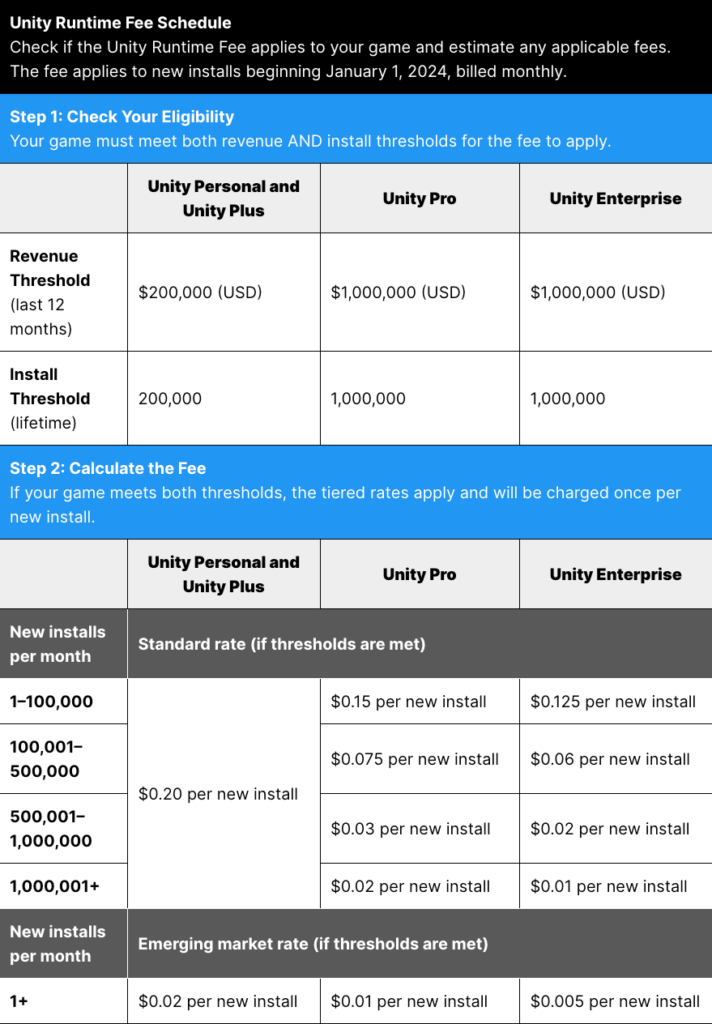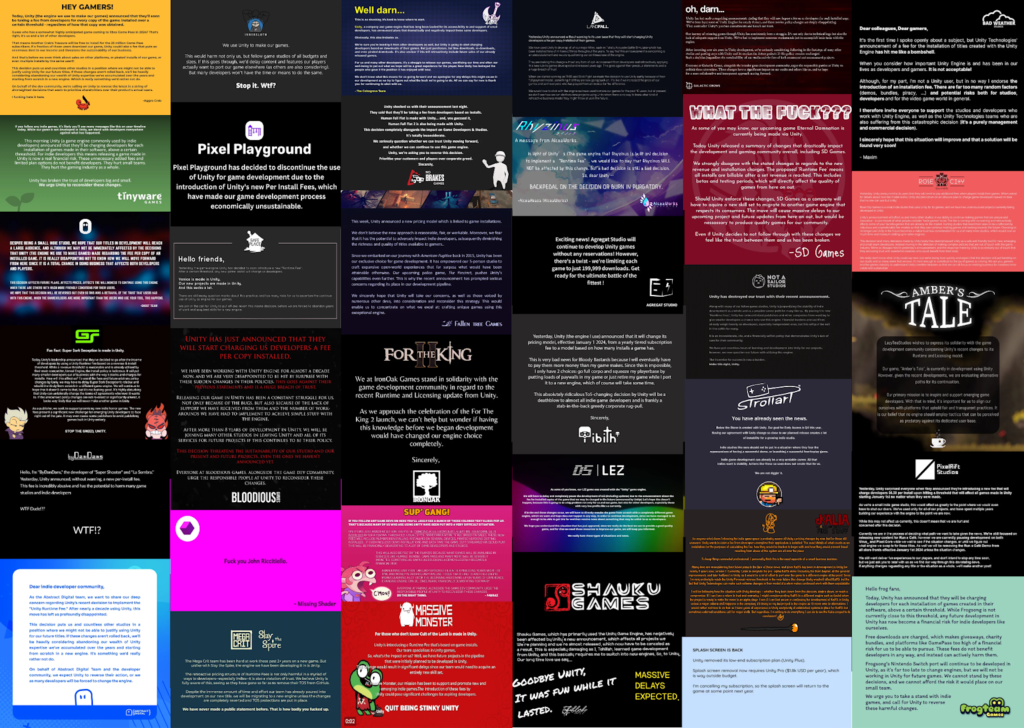Important: There have been updates on the price changes. There is a new article that covers the final changes in the prices. Check it out here.
Unity made again into the news cycle for all the wrong reasons, is kind of a trademark for them at this point.
Out of the blue, Unity Technologies decided to change the pricing model for their engine. This change applies in January 2024 and is valid for every game using Unity, past, present and future.
The announcement was released on Tuesday (09/12/23). Several amendments and clarifications were made in the following days because, as usual with this kind of thing, the initial statement was atrocious. That’s why, after a couple of days and with more information, I will try to explain the most significant changes, the impact of those changes, and why the entire dev community is furious.
What Changed?
Unity divided the engine into two components and will charge differently for each one. You will have a licensing model based on the Editor (where you make the game) and a different install-based model for the Runtime (where the game runs once you install it).
The first part didn’t change much, or at least is not the most important one. They played around with the different tiers, added some benefits, etc., but nothing too crazy for the most part.
On the contrary, the new install-based model (from now on, runtime fee) added a fixed price over new installations for any game after reaching the thresholds to activate this mode. Based on the engine license, the runtime fee will vary if lifetime installs and revenue thresholds are fulfilled.
Below is the chart with all the information. The cost for each new install will vary based on license, number of installs and market, but the TLDR is:
- Unity Personal and Plus will be charged if the game surpasses USD 200.000 in revenue in the past 12 months AND lifetime installs above 200.000
- Unity Pro and Enterprise will be charged if the game surpasses USD 1.000.000 in revenue in the past 12 months AND lifetime installs above 1.000.000

These charges are per new install (new players in your game), by month, and only care about revenue. Every Unity developer that fulfills those thresholds at the start of next year will have the production cost increased, in some cases substantially.
It is also imperative to note that these charges are fixed, they are based on a % or profit. If your game costs less than 5 dollars, in some platforms, they are eating the profit from the developer, or at minimum a good part of it. If your game is FTP, and your business model is based on installs, you are in a big problem.
Some Answers
After all the noise in the social space about these changes and a lot of misinformation, it is pertinent to clarify some of the most common and essential questions developers are asking.
You can check the FAQ from Unity to get answers to some questions but, for the most part, these are the most important ones.
- The fee target is the game industry. Filming, gaming, and education are not impacted yet. Also, web and streaming games will not be charged with the fee.
- Demos that can’t be upgraded to full game will not be charged. Early access builds are not demos, so they will be charged.
- Multiple installs on the same hardware will count as only one. On the other hand, multiple installs from the same user on different hardware will count for each install. If you buy and install a game on 3 computers, the developer will be charged 3 times.
- Piracy or abusive behaviors (install bombing) will not count toward the install count.
- For games in subscription-based services, they will charge the service. So, if you publish on Game Pass, they will invoice Microsoft.
Questions
Even after some clarifications, updating their FAQ and social media responses, many questions need a clear answer. I will share the ones I have, but if you are looking for more, the official forum thread on this has A LOT to offer.
For me, the most basic question is how are they going to track all this? I know Unity already has a lot of data trackers in the engine, but the information required to do this efficiently is just not there. For every question regarding tracking, from revenue to installs to piracy, the answer is, in a nutshell, “we have models for processing this information, trust me”. Imagine the amount of disputes and grunt work developers and Unity staff will have to endure when this fee starts to roll.
Their FAQ mentioned that subscription-based services will be in charge of this. This one is mind-blowing to me. They think they can go to Microsoft, Sony, or Nintendo and say, “Here is the invoice for all the installs in your service for games made by your companies that use Unity. Thanks”. Can anyone imagine a world where that goes by without any legal repercussions? Also, based on which revenue estimation? Because it is not at all how that part works on those services.
Also, their FAQ has an answer that needs to be clarified because how I understand it makes me believe they are delusional.

Are they suggesting that Steam will be in charge of paying this fee? Apple? Don’t get me wrong, Unity has a lot of influence because the penetration in the industry is insane. The number of games made in Unity is way higher than any other engine. But are they just trying to burn every bridge possible and try to go against the major players in the industry?
Why?
The reason for these changes is very straightforward to me, and yes, you guessed it right, money. Unity Technologies is still trying to be profitable; their money flow is not good, and they must do something to make the company profitable.
Charging a fixed price over installations is their way to make money fast. There is a reason why they charge by month rather than annually. They need income as quickly as possible.
Also, they want a piece from the companies making millions while Unity is making pennies—the mobile market. See, Unity’s penetration in the mobile world is outstanding. You can check the Unity Gaming Report for 2022 to see the numbers yourself. In particular, Unity is huge in the casual space, which is based on the FTP model where, more or less, companies relies on massive amount of installs to make their profit.
One more thing was unveiled yesterday. Unity will remove the new fee if the company switches to its LevelPlay service. In fact, they are already offering to waive the Runtime Fee for studios that already use the service. For those who don’t know, LevelPlay is Unity’s ad platform. So this change is not only for direct cash but also to grow their ad revenue. Rereading the FAQ, you can see how this move is suggested in the following item

In my opinion, this is the key to the changes in the price model. They want a piece of the mobile world. Sure, there are other platforms too, but mobile is where the big bucks are made. They want their piece on Genshin Impact.
It is worth mentioning that several Unity higher-ups sold stocks the previous week of the announcement, particularly the CEO. I know nothing about the stock market, but I would not be surprised if this whole thing is also a way for some people to make quick bucks before leaving the company.
Impact
These changes put the entire game dev community on arms. As a community, it is outstanding to see everyone more or less on the same page. Everyone supports each other and tries to make the best of the situation.
Lots of developers have already decided to move to other engines. Others are trying to make Unity revert their decisions or will not just leave the engine but also remove their games from the stores.
The following image is a fraction of all the studios that have been making statements regarding these changes. Check the original Reddit thread.

Besides the impact on the community, these changes significantly impact the business of making games with Unity.
Making games takes years. Sure, you have successful games made in a couple of months, but those are not the norm. Any game of considerable size takes years. Developers build their business model based on several aspects, and one crucial aspect of that process is the engine to consider for your development. Those developers now have a possible cost increase in their game that was not anticipated when the business plan was made. In fact, this could change their entire business model. And the worst part is that this change applies to anyone, is not for future projects, is any game delivered with Unity.
Studios that based their model on FTP games will be the most affected. We have to remember that not all FTP games make billions. There are a lot of studios that use that business model and are barely making a profit. In some cases, the new Unity install fee is higher than the acquisition cost of a new user.
Even publishers will be affected because they will have to consider that fee to set the price of a game. So now, if you pitch your Unity game to a publisher, you are at a disadvantage because of the engine you choose. Devolver Digital is a known publisher in the Indy space, and many of the games they publish are made with Unity. Here is their tweet after Unity added the install fee.

Final thoughts
For me, it is sad to see how a product beloved by so many people and one of the most active communities in the software development world gets destroyed by the company.
The worst part is the loss of trust and respect for Unity. It will be tough for any studio or publisher to trust a company that changes its agreement unilaterally. And not just for new projects, these changes in the contract apply to every product released under the platform.
This lost trust will impact the current projects and future ones. Several studios early in development have stated they will migrate their project to other engines. Sadly, for others already invested, this is impossible. For future projects, how can you trust your development to a company that can change the rules anytime and without consulting with their clients?
Even if Unity Technologies reverts all these changes tomorrow, they have lost already. Sure, in the short term, it will not impact their earnings, but in the long term, they will notice the impact of their actions. They destroyed their customers’ trust, one of the most critical assets of any product. Getting that trust back will be an effort that I don’t know if they can achieve or if they even care.
